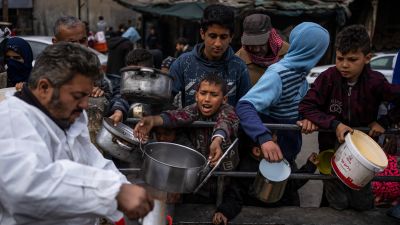US urges caution from Israel as famine looms in Gaza with 'acute levels of food shortages'

ITV News' Emma Murphy reports as a desperate situation in Gaza is predicted to turn into an outright famine
Both the United States and the United Nations (UN) are adopting a common diplomatic position on Gaza, and it's against Israel.
On Tuesday, President Joe Biden's administration agreed that the situation in the north of the territory is one of utter desperation.
In northern Gaza, where Israel's military operation began in the wake of the October 7 atrocities, the emergency fallbacks have failed.
Bird seed, animal feeder and grass - which people have survived on - have run out.
US Secretary of State Antony Blinken said the entire population, not just in the north, was suffering acute levels of food shortages.
"That's the first time an entire population has ever been so classified," Mr Blinken said.
Why is northern Gaza suffering so badly? ITV News Correspondent Emma Murphy explains
The latest findings came from the Integrated Food Security Phase Classification (IPC) found virtually everyone in Gaza is struggling to get enough food.
The IPC has said that around 677,000 people - nearly a third of the population of 2.3 million - are experiencing the highest level of catastrophic hunger.
This means they are facing an extreme lack of food and critical levels of acute malnutrition.
Outright famine - driven by an acceleration in the death rate - is projected to occur in the north of the besieged enclave anytime between now and May, the IPC said.
The report warned that if Israel targets Rafah, as Prime Minister Benjamin Netanyahu has vowed to do, more than half of Gaza's population could face famine.
Even before the war, 80% of Gazans relied on humanitarian aid and nearly half of all households didn't have enough food.
Children younger than five; pregnant and breastfeeding women, the elderly, and people with underlying health conditions are most at risk from malnutrition.
In acute crises like that seen in Gaza, malnutrition affects the youngest children first, experts have warned.
Foreign Officer minister Andrew Mitchell told the Commons that he is “deeply concerned” about the growing risk of famine in Gaza and the longer term effects of the ongoing conflict and that Israel “must do more” to provide land routes for aid.
But the minister, who acts as a deputy for Foreign Secretary Lord Cameron in the Commons, was warned by shadow foreign secretary David Lammy that current levels of aid going into Gaza are “woefully inadequate” and also claimed that the famine is “man-made”.
Mr Lammy added that a planned Israeli offensive in the southern Gaza city of Rafah would risk “catastrophic humanitarian consequences” and called on the government to work to prevent a further attack.
Biden and Netanyahu agreed in a phone call on Monday to hold a meeting between US and Israeli officials in Washington to discuss the US administration’s concerns about Israel’s plans for an operation in the southern Gaza city.
Netanyahu said he remains determined to carry out a Rafah ground offensive, despite the US urging him not to.
On Tuesday, US officials said an Israeli strike killed Marwan Issa, the deputy leader of Hamas’ armed wing in Gaza who helped plan the October 7 attack.
Israel and Hamas have not confirmed Issa’s death, but White House National Security Advisor Jake Sullivan announced he had been killed in an operation last week.
It means Issa would be the highest-ranking Hamas leader to have been killed in Gaza since the start of the war.
Have you heard our podcast Talking Politics? Every week Tom, Robert and Anushka dig into the biggest issues dominating the political agenda…